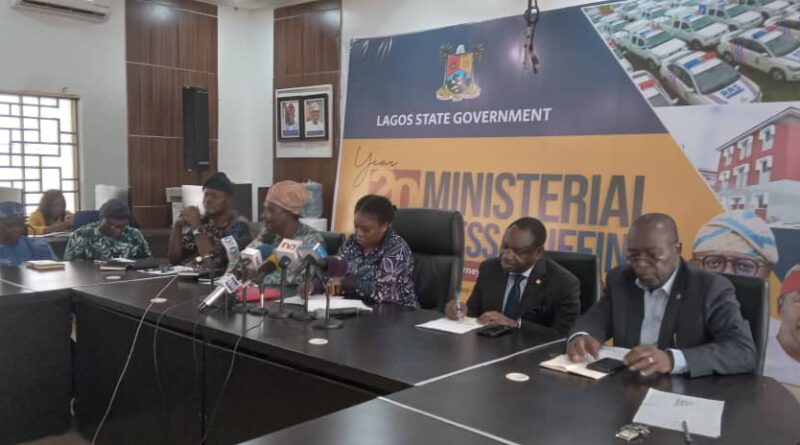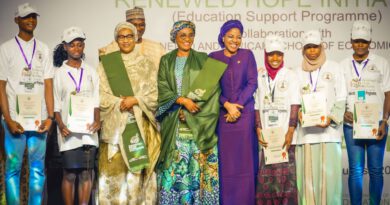Sanwo-Olu’s Vision for Food Security Bears Fruit as Lagos Records Massive Gains in Agriculture
…Abisola Olusanya reels out Govs achievements
In a landmark ministerial briefing held on Tuesday, May 6, 2025, at the Kaltho Baguda Press Centre, the Lagos State Commissioner for Agriculture and Food Systems, Ms. Abisola Olusanya, reeled out impressive achievements that underscore Governor Babajide Sanwo-Olu’s transformative vision for a food-secure Lagos.
The briefing, attended by journalists and stakeholders across sectors, highlighted the state’s strategic shift from subsistence agriculture to a resilient, inclusive, and sustainable food system built on innovation, public-private partnerships, and upcountry collaboration.
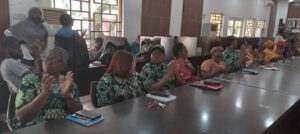
Ms. Olusanya outlined a four-pillar strategy—domestic sufficiency, upcountry partnerships, food storage and logistics development, and market infrastructure optimization—that has steered the ministry’s agenda over the past six years. These efforts, she noted, have yielded significant results across training, infrastructure, enterprise support, market access, and social impact.
Over 100,500 farmers and fishermen have received training in modern agricultural techniques, enhancing food production and rural livelihoods. The Lagos Agripreneurship Programme (LAP) alone trained 4,400 youths, while the state’s agric school farm initiative now operates in over 100 senior secondary schools and correctional centres.
Lagos has recorded historic infrastructure investments, including the commissioning of the Imota Rice Mill—the largest in Africa and third globally—which produces 2.4 million 50kg bags annually and supports over 250,000 jobs.
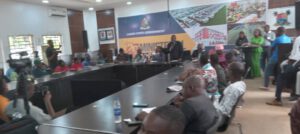
Another flagship project, the Lagos Central Food Security Systems and Logistics Hub in Epe, is nearing completion. Set to be the largest food hub in Sub-Saharan Africa, it will process and distribute over 1.5 million metric tonnes of food yearly. Phase 1 is expected to be completed within months and is anticipated to drive a 30–50% reduction in food prices across the state.
Additional milestones include mid-level food hubs in Mushin, Ikorodu, Festac, and Lekki, as well as the establishment of ranches in Epe and over 13km of farm access roads.
Over 151,000 agri-businesses have benefited from various grants, subsidies, and inputs under initiatives such as the Trader Money Scheme, the Ounje Eko Farmers Subsidy Programme, and the Agricultural Value Chains Enterprise Activation Programme (AVCEAP). The Agrinnovation Club awarded N100 million to 26 young agro-innovators to scale their businesses.
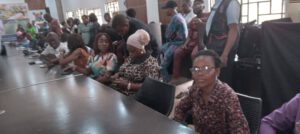
The Lagos Central Food Hub is being developed under a Design-Build-Finance-Operate-Transfer (DBFOT) PPP model, incorporating cold storage, repackaging facilities, e-commerce platforms, and quality control labs. The hub is expected to create over 5 million income opportunities and secure food availability for at least 90 days during emergencies.
Also notable is the Lagos Aquaculture Centre for Excellence (LACE), which will produce 50 million fingerlings and 24,000 tonnes of aquafeed annually, while integrating 5,000 smallholder fish farmers into a profitable value chain.
To combat rising food costs, the government launched Fresh Food Hubs and Last Mile Red Meat Shops across strategic locations. These initiatives are improving meat hygiene, empowering youth, and ensuring affordable food distribution to underserved communities.
Over 800,000 households have benefited from state food subsidies, while more than 1.2 million families received assistance through food banks. The Urban Farming Programme has further enabled households—especially women—to engage in backyard farming, improving nutrition and economic independence.
Ms. Olusanya emphasized the role of Lagos State’s 5-Year Agricultural and Food Systems Roadmap (2021–2025) in guiding strategic investments and private sector collaboration. Community-driven projects like FADAMA III and L-CARES (a COVID-19 recovery program supported by the World Bank) have also played a critical role in strengthening food supply chains and protecting livelihoods.
The Commissioner affirmed the state government’s continued commitment to building on these gains.
“We have laid a solid foundation for a food-secure, economically vibrant Lagos. Our journey is far from over, but our direction is clear,” she said.

